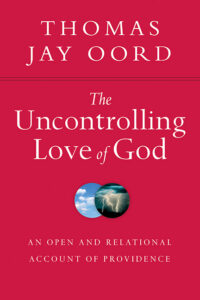What is Uncontrolling Love? What About Therapy?
I’m excited to announce a new book project!
Along with co-editors Annie DeRolf, Christy Gunter, John Loppnow, and Lon Marshall, I’m inviting therapists, psychologists, and counselors to write essays on their work in relation to uncontrolling love.
What is Uncontrolling Love?
The “uncontrolling love” label is found in several books, including The Uncontrolling Love of God and Uncontrolling Love. I originally used the phrase to describe God’s love as uncontrolling.
To many, it’s commonsense that love does not control. Love doesn’t dominate, overpower, or force. The Apostle Paul put it simply in Corinthians 13:5: “Love does not force its own way.”
While many would affirm that human love does not try to control others, few apply this logic to God. Making this application was central in my book, The Uncontrolling Love of God. I advanced it also in the more accessible book, God Can’t.
The Core Notion
Here’s the idea in a nutshell:
Because love is uncontrolling, and because God loves everyone and everything, God can’t control anyone or anything.
Saying God can’t control helps make sense of many issues. Perhaps the most obvious is the problem of suffering and evil. An uncontrolling God simply can’t stop evil singlehandedly. So God’s not to blame.
To Be More Precise
Philosophers use a phrase to speak about an outcome resulting from a single cause. They call this sole factor “the sufficient cause.” By this, they mean a single cause entirely determined some result.
Most theologies have said God can decide outcomes singlehandedly. The uncontrolling love view says God can’t do that. God can’t control others, because love is uncontrolling.
Bodily Impact
One common response to this proposal points to a human example. Sometimes humans can pick up a child – against its desire to be picked up – to rescue them from harm. Perhaps a mother might grab a two-year-old just before a car zooms by.
Isn’t rescuing children from harm an act of love?
Yes. Using our bodies to rescue others is loving. But there are three important ideas we must add to make sense of this insight.
1. Using our bodies to impact others does not mean we control them. We do not act as sufficient causes, to use the philosophical language. Those we impact retain a degree of freedom. Parents who pick up screaming 2-year-olds know full well they can’t control their children!
2. God doesn’t have a localized divine body with which to impact others. As an omnipresent Spirit, God has no divine hand, claw, or leg. Consequently, God can’t do what localized creatures sometimes can: use their bodies to rescue.
3. God calls upon creatures to use their bodies for good. When creatures respond to that call in cooperation, they become God’s metaphorical bodies. They’re God’s metaphorical hands and feet. Of course, creatures don’t always respond well to God’s call. And sometimes the circumstances aren’t conducive to the rescuing God wants.
Is God on the Sidelines?
The uncontrolling love view does not say God is uninvolved. Nor does it say loving creatures should be uninvolved. Rather, the view says lovers influence without dominating, empower instead of overpowering, and encourage rather than withdraw.
The God of uncontrolling love is not sitting on Mars watching us live our lives alone. Rather, this God is omnipresent and omni-influential. And God’s action is always loving, in the sense of working for well-being.
What Does This Have to Do with Therapy?
Since writing the books I mentioned, I’ve received numerous notes from counselors, psychologists, and therapists. Most thank me for the books I’ve written. And many say something like, “What you write is what I’ve been telling my clients for some time. You just articulate it better.”
Many of these therapists give copies of God Can’t and similar books to those they seek to help. And this way of thinking about God has helped countless people who suffer.
All of this got me and my book project editors to think: How might we articulate the connection between uncontrolling love and healthy practices in therapy? What ideas might help clients? How can victims of evil and victimizers think differently about God, love, and healing? And so on.
If you self-identify as a therapist, psychologist, or counselor and might be interested in writing for the book, send me or one of my co-editors a note!



Comments
I’m definitely interested in writing an essay but am unclear about an estimated word count or a submission deadline. Can you say more?
Send me an email, and I’ll reply with more details.